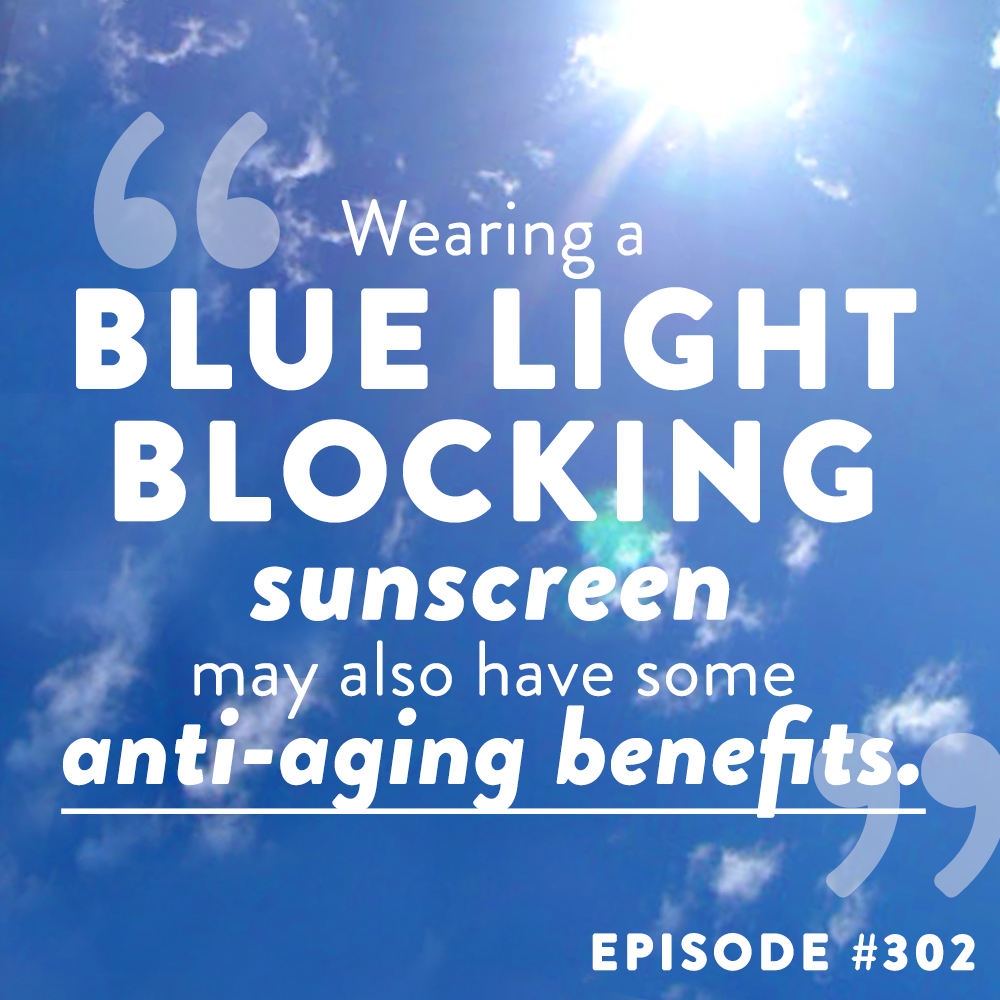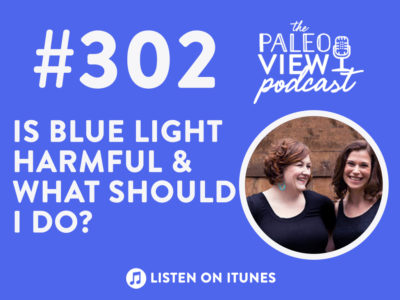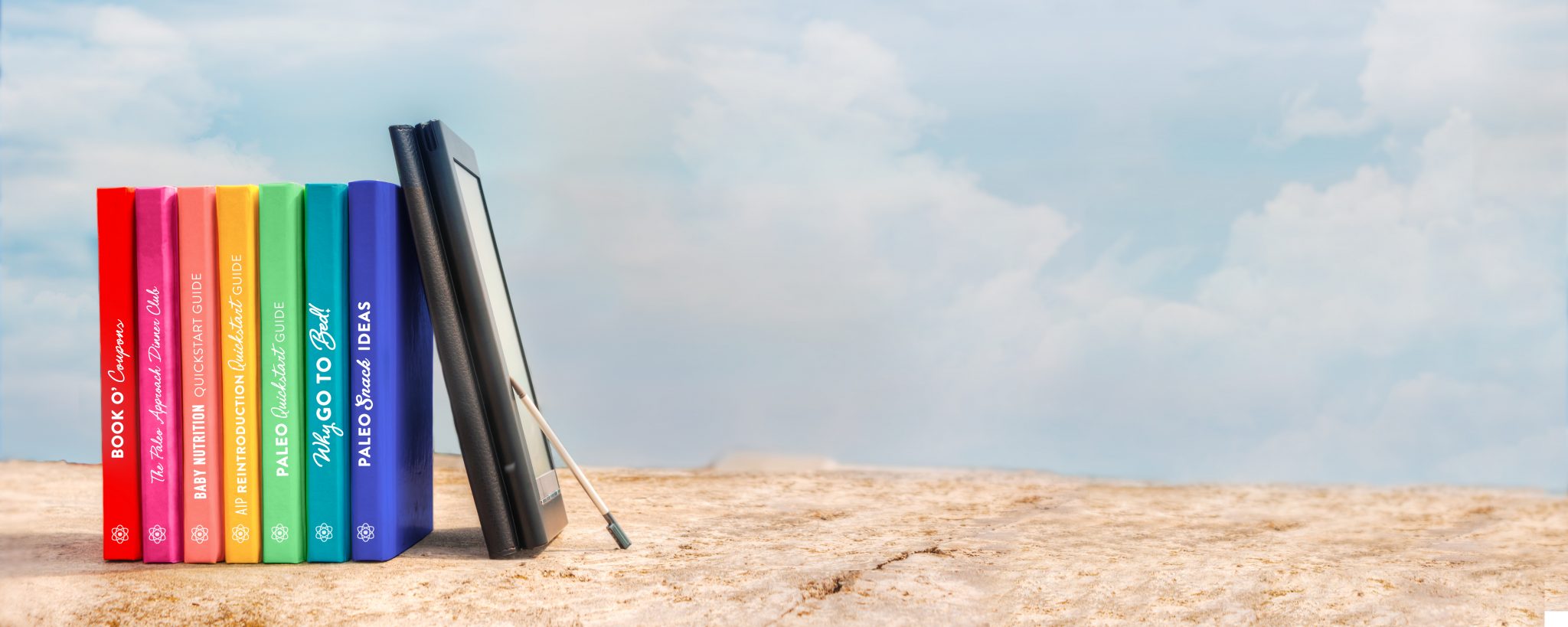In this episode, Stacy and Sarah discuss the latest thing people are becoming concerned about: blue light
Click here to listen in iTunes
or download and listen by clicking the PodBean Player below
![]()
If you enjoy the show, please review it on iTunes!
The Paleo View (TPV), Episode 302: Is Blue Light Harmful and What Should I Do?
- Intro (0:00)
- News and Views (0:40)
- We’re back with part 2 of sunscreen science bonanza!
- We love it when you leave us reviews- send us an email, leave a comment on social media or our blogs!
- Thanks to Mary for her wonderful review of our How Many Vegetables?! podcast.
- Admittedly, sunscreen was one of the last things Stacy switched over to a healthier version.
- Sarah switch years ago when her kids were very little.
- She never liked the feel of chemical sunscreen on her skin.
- Stacy was afraid of switching away from the chemical sunscreens she knew she could count on.
- She was genuinely surprised that the mineral sunscreen worked!
- Sarah switch years ago when her kids were very little.
- Zinc Oxide and Titanium Dioxide
- These are the two minerals used in mineral or physical sunscreen.
- They reflect UV radiation back.
- Sarah loved the idea of zinc-oxide based sunscreen because of her history using diaper cream as a “cure all.”
- Question from a listener: Jordan asks,
- “Hi! I absolutely love The Paleo View and love listening to you guys every week! I’ve learned so many awesome new things and really look forward to it every week. I just saw your post on the Facebook group about the new Beautycounter sunscreen and have a question about the blue light blocking. I’ve heard that it’s actually important to get blue light during the day to help with your circadian rhythm (and help sleep) and would love if you and Sarah could go into that more, especially regarding this new sunscreen. I’ve always used conventional sunscreens and was about to buy new Beautycounter sunscreen to use a better product, but now I’m curious about this new line.”
- “Zeitgeber,” is a German word for “clock-setter,” referring to something in the external environment that helps set our internal clock.
- Our clocks will run without external stimulus for up to three weeks, studies have shown.
- Blue light from the sun during the day, dim red light in the evenings, and darkness at night are the most important zeitgebers, giving the cues to our circadian rhythms.
- The photoreceptors detecting these are way more sensitive in our eyes than in our skin.
- It is much more important for our eyes to detect sunlight and blue light than our skin.
- It is unlikely that wearing a sunscreen that blocks blue light will wreck circadian rhythms.
- Screen time and indoor lighting.
- It is not enough blue light to hit the sunlight signal to our internal clocks.
- Using blue light blocking glasses to protect your eyes from strain is not likely to hinder your internal clock as long as you see the sunlight at some point during the day.
- LED screens have more blue light and can interfere with melatonin, especially in the evening.
- Blue Light: Good or Bad?
- Zinc oxide and titanium dioxide naturally block blue light!
- Other compounds that will block blue light:
- Lutein (this is what is in the Beautycounter sunscreen Jordan was asking about).
- Synthetic melanin.
- Blue light is now recognized to accelerate skin aging.
- This is from increasing the formation of oxidants in the skin.
- This happens at about a quarter of the level that UV radiation does.
- This is from increasing the formation of oxidants in the skin.
- It degrades carotenoids, the natural antioxidants, in our skin.
- These carotenoids recover very quickly after being degraded by blue light.
- It is being used in the medical fields for treating various skin disorders.
- Wearing a blue light blocking sunscreen may also have some anti-aging benefits.
- Stacy noted that just as the sun has both benefits and harm, blue light also seems to have the same nuances.
- Blue light doesn’t cause DNA damage and is not linked to skin cancer.
- One study showed blue light-induced apoptosis in melanoma cells.
- Another paper showed blue light stimulated the production of melanin.
- What about Zinc Oxide?
- Very well known for 80+ years to be beneficial for skin health.
- Used in diaper creams, skin protectant creams for elderly, etc.
- It has anti-inflammatory and anti-microbial properties.
- Stacy feels that the zinc oxide in the face products and sunscreen she uses has helped her adult acne.
- Zinc is part of the molecular structure of the vitamin D receptor.
- Very well known for 80+ years to be beneficial for skin health.
- What about Nano Particles?
- Stacy always looks for “non-nano zinc oxide.”
- Nanoparticles go on more transparent and sunscreen looks less white/chalky.
- There isn’t a definition for nanoparticle versus microparticles.
- Changing the particle size changes the wavelengths they reflect.
- Nanoparticles reflect UVB better and are worse at reflecting UVA.
- There is a small amount of research showing nanoparticles can be absorbed into the skin and can cause cellular damage- more research is needed in this area.
- There is definitely research showing that nanoparticles can be problematic if inhaled.
- Stacy is concerned over using a spray or powder with nanoparticles for this reason.
- Some spray sunscreens don’t differentiate if the particles are non-nano or nano.
- The overall takeaways from both shows:
- Burning = bad.
- Non-burning sun exposure = good.
- Sunscreen use when burns might happen = good.
- Chemical sunscreens = bad.
- Physical sunscreens that are non-nano and non-aerosol with added phytochemicals = good.
- Stacy recommends that if you don’t want to age your face, wear SPF on it every day.
- Sarah uses Araza cream foundation and powder, which has zinc-oxide.
- Stacy uses a Dew Skin tinted moisturizer with zinc oxide and titanium dioxide.
- If you’ve enjoyed the show, please recommend it to someone who might enjoy it.
- We love when you share and when you leave reviews for us! Thanks for listening!





 Can Paleo or AIP Diets Cause Loss of Immune Tolerance?
Can Paleo or AIP Diets Cause Loss of Immune Tolerance?